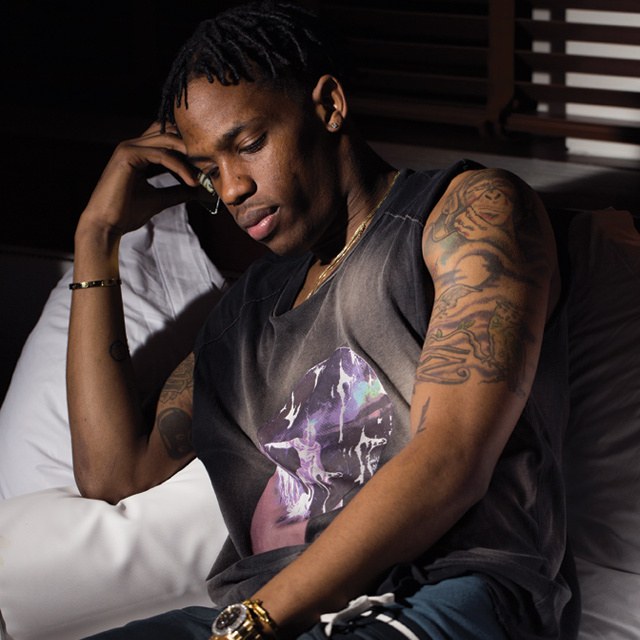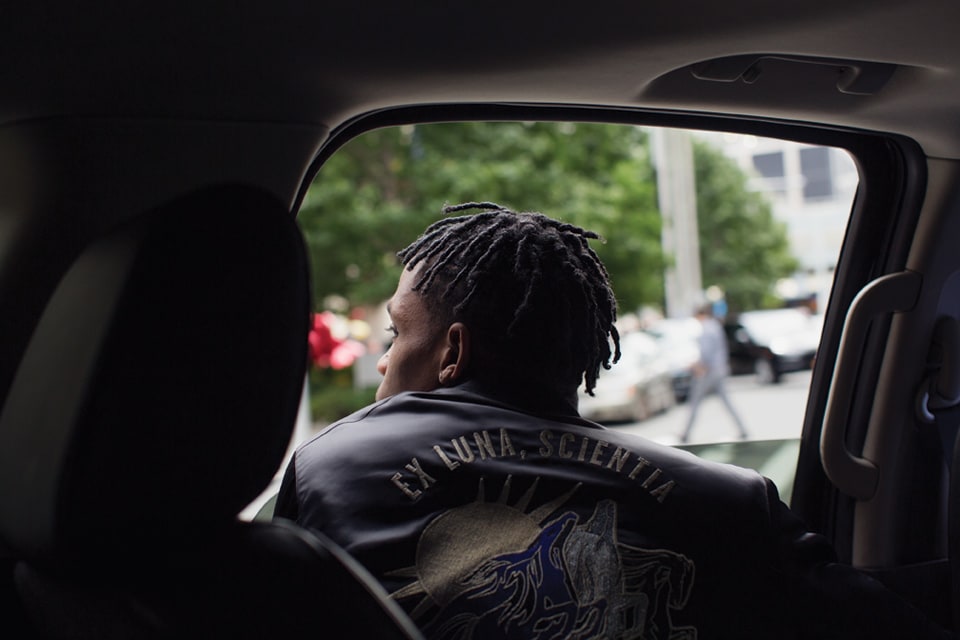 Travis Scott. Photo by Jonathan Mannion for The FADER
Travis Scott. Photo by Jonathan Mannion for The FADER
“I don’t like someone knowing more than me,” Travis Scott told Sam Hockley-Smith in his November 2013 FADER cover story. It was a bold statement at the time, given his catalog — some high-profile but by no means prolific production credits, and a promising but amateurish debut mixtape called Owl Pharaoh.
Days Before Rodeo, released exclusively on Soundcloud in August 2014, was the first real proof of Scott’s concept: Surrounded by big-name co-producers like Mike Dean, Metro Boomin, Lex Luger, and Southside, as well as features from the likes of Young Thug, Rich Homie Quan, and the Migos, Scott is never the best at what he’s doing, but his production is studied and encyclopedic, a testament to the 10,000 hours behind the decks that — along with luck and connections — undoubtedly laid the groundwork for his ascent into rap’s stratosphere.
The success of Days Before marked the true beginning of the Travis Scott project, one that’s now been canonized with four studio LPs and 50 million units sold in the U.S. alone. Inch-deep lyrically (in Scott’s own verses, at least) but mile-wide in its incorporation of disparate styles and sounds, DBR showed the world that Scott could be a crafty collaborator and a hyper-talented big-picture producer across a full-length record, if not an especially convincing MC.
Marking the mixtape’s 10th anniversary, Scott has made it available on the major streaming platforms for the first time, performed it in full at Atlanta’s Masquerade, and dropped six deluxe vinyl/digital editions as exclusive purchases on his website, featuring previously unreleased tracks from the DBR era.
I first heard Days Before Rodeo days after its release, during syllabus week of my sophomore year at what some call the Harvard of the South but is really the Harvard of the Gulf South at best. I was sitting in a collapsible lawn chair in the bathroom/common space of the quadruple-double suite I shared with six friends at the time — all of us white, most of us hip-hop aficionados in our own minds. We were probably passing around a big glass bong with a tobacco-laced party bowl, and I was probably coughing a lot.
DBR hit a sweet spot for us, as Scott’s work has for countless high school and college-aged white boys since: The beats were derivative, but mostly of the Kanye and Cudi beats we’d grown up on, and their sleek veneers — along with some legitimately clever twists — made them sound shiny and new. The rhymes — callously misogynist, but in a more comfortably middle-class way than what we’d heard from other southern trappers — blew our malleable masculine minds.
Teeming with testosterone, tracks like “Mamacita,” “Don’t Play,” and “Sloppy Toppy” (still my personal favorite) are perfect fare for parties paid for by the parents of future financial consultants — a fact Scott winkingly acknowledges in the mic-drop line of his subprime verse on the latter track: “No I do not do beer cans / Fuck is this frat house?”
Others, like “Quintana Pt. 2” and “Backyard,” show his versatility as a leading man. The former, based around a contagious hook — “Finessin’, finessin’ / I can’t go one day without finessin’” — and a classic Mike Dean/Southside beat, is an elite flex. (It originally featured uncredited vocals from all-time flexer T.I. but these are erased on the reissue.) And the latter, a boom-bap gesturing joint, shows his ability to put his own spin on his genre’s classic sound.
Then there’s “Drugs You Should Try It,” an instant sadboy classic that beats Cudi — Scott’s personal hero and the reason for the “Scott” in his stage name — at his own lonely-stoner game. Over a gorgeous, self-produced guitar instrumental, he lays out a lovesick ode to substance abuse that has connected with young users the world over. It’s a hoodie-zipped-all-the-way-up, drawstring-stretched-all-the-out anthem that feels far less profound to me at 29 than it did at 19 but remains an undeniable bop. Even when Scott isn’t really saying anything, he knows how to make it sound good.
The problem with Scott’s music in the days during and after Rodeo, his first official studio LP, stemmed from his main-character aspirations. DBR is at its best when Scott takes the opportunity to highlight more talented MCs: Mamacita pops because it features former Rich Gang partners Rich Homie Quan and Young Thug, the latter of whom outshines Scott again on the towering “Skyfall”; “Don’t Play” would do well to drop its annoying Matty Healy cameo, but Big Sean, before he exposed himself as irredeemably corny, gives the song the juice to drive it beyond its catchy hook; and “Sloppy Toppy” — an unsung, fantastically raunchy modern classic — succeeds not despite but because of its comical number of guest verses, from all three Migos and Peewee Longway.
Despite a weak back half (“Sloppy Toppy” and “Backyard” excepted) featuring the mediocre “Basement Freestyle” and “BACC” (a bonus), the Cudi/Khalifa-indebted “Grey,” and the truly awful “Zombies,” Days Before Rodeo is the consummate document of Travis Scott reaching both peak quality and critical mass. It’s hard to argue that Scott would’ve been wise to remain behind the scenes, given his ensuing chart domination and worshipful following, but the listening public would be better off if he had.
 Photo by Jonathan Mannion for The FADER.
Photo by Jonathan Mannion for The FADER.
In a viral 2015 Deadspin essay, Bill Haisley bashes the Travis Scott hype bubble convincingly enough to prove beyond a reasonable doubt that Scott is a biter — of beats, rhymes, and wholesale personas. Unfortunately, his argument stems from two faulty premises: that the bubble will burst, and that Travis Scott is worse than Iggy Azalea. Both have proven empirically false.
Whatever you think of his output over the past decade, Scott has been hugely successful and built a big tent full of superfans — not just the white teens who comprise the majority of what most agree are the worst live crowds of all time. Regardless of the frenzied mix of toxic hormones his music and overall energy whip up in the pituitary glands of impressionable young men, you can never fully fault an artist for their fandom.
2018’s Astroworld — a gleefully maximalist epic with a single that dwarfs everything else in his catalog in catchiness and memeability — is easily Scott’s best project since Days Before. Elsewhere, though, his records have fallen flat, failing to reproduce the cunning vitality that made his sophomore project so exceptional. 10 years after its release, Days Before Rodeo remains Travis Scott’s best work, and he’s right to celebrate it now. Its wide release on the DSPs is, of course, a cash grab, and Scott moved past the need for critical approval years ago, but he’d do well to revisit his breakout mixtape’s secret sauce. It just might add the spice to his future releases that his recent ones have sorely missed.